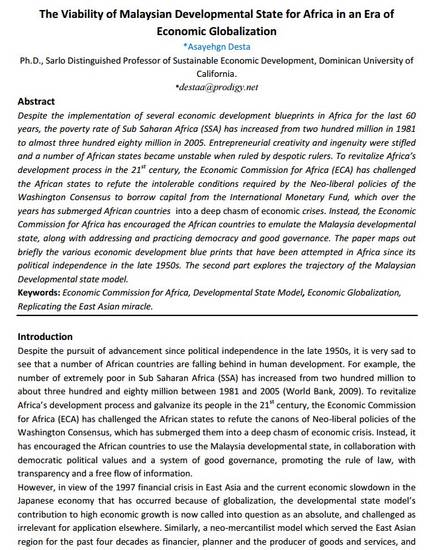
Article
The Viability of Malaysian Developmental State for Africa in an Era of Economic Globalization
International Journal of Business and Behavioral Sciences
(2012)
Abstract
Despite the implementation of several economic development blueprints in Africa for the last 60 years, the poverty rate of Sub Saharan Africa (SSA) has increased from two hundred million in 1981 to almost three hundred eighty million in 2005. Entrepreneurial creativity and ingenuity were stifled and a number of African states became unstable when ruled by despotic rulers. To revitalize Africa’s development process in the 21st century, the Economic Commission for Africa (ECA) has challenged the African states to refute the intolerable conditions required by the Neo-liberal policies of the Washington Consensus to borrow capital from the International Monetary Fund, which over the years has submerged African countries into a deep chasm of economic crises. Instead, the Economic Commission for Africa has encouraged the African countries to emulate the Malaysia developmental state, along with addressing and practicing democracy and good governance. The paper maps out briefly the various economic development blue prints that have been attempted in Africa since its political independence in the late 1950s. The second part explores the trajectory of the Malaysian Developmental state model.
Keywords
- Economic Commission for Africa,
- Developmental State Model,
- Economic Globalization,
- Replicating the East Asian miracle
Disciplines
Publication Date
December, 2012
Citation Information
Asayehgn Desta. "The Viability of Malaysian Developmental State for Africa in an Era of Economic Globalization" International Journal of Business and Behavioral Sciences Vol. 2 Iss. 12 (2012) Available at: http://works.bepress.com/asayehgn_desta/15/
